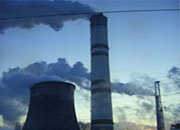ENEL DISCONNECTED UNIT I OF COAL PLANT BOCAMINA THREE YEARS BEFORE DATE SET IN CHILE’S NATIONAL DECARBONIZATION PLAN
With this milestone, coupled with the closure of Tarapacá coal plant on December 31st, 2019 and the expected closure of Enel’s last coal facility in the country, Bocamina’s Unit II, by May 2022, the company is steadily progressing towards the decarbonization of its Chilean generation mix.
“We have reached a historical milestone for our presence in Chile,” said Salvatore Bernabei, Head of Global Power Generation at the Enel Group. “We are advancing at full speed towards an increasingly sustainable generation mix. By 2023, we will have shut down our entire Chilean coal fleet, that used to total 636 MW up until 2019, and completed around 2.4 GW of additional renewables in the country. At present, out of the above targets, we have already phased out 286 MW of coal with the closure of Tarapacá and Bocamina’s Unit I and we have around 1.3 GW of renewables under construction. Likewise, with the closure of Bocamina’s Unit II, we are expected to become the first power company to shut down coal-fired generation in Chile.”
The closure of Bocamina’s Units I and II has been accelerated compared to what was projected by Enel Generación Chile in the country’s National Decarbonization Plan signed with the Chilean Ministry of Energy on June 4th, 2019. Towards this aim, on May 28th, 2020, the Enel Group informed the market that it decided to accelerate this closure. On July 6th, 2020, Enel Generación Chile received the authorization from the country’s National Energy Commission to disconnect Bocamina’s Unit I.
The Enel Group has placed the acceleration of the energy transition at the core of its Strategic Plan for 2021-2023. During the presentation of the Plan, which also includes a Vision to 2030, Enel announced that investments in renewables, in line with the Group’s “Ownership” and “Stewardship” business models, are expected to lead to an overall installed renewable capacity of more than 67 GW by 2023, with a view to reaching around 145 GW of installed renewable capacity by 2030. Enel also announced that it would bring the coal phase-out date forward to 2027 from the previously announced 2030, positioning the Group well on track to achieve its science-based decarbonization target of 80% Greenhouse gas (GHG) emission reduction in 2030 versus 2017 levels, and to achieve its 2050 full decarbonization target.
Enel in Chile is the largest power company by installed capacity with over 7,200 MW of which over 4,700 MW from renewable energy, namely over 3,500 MW from hydro, more than 600 MW from wind, about 500 MW from solar and approx. 40 MW from geothermal. The Group also operates in the distribution sector through Enel Distribución Chile, which serves around 2 million customers, as well as in the advanced energy solutions business through Enel X Chile.
Enel is a multinational power company and a leading integrated player in the global power, gas, and renewables markets. It is the largest European utility by ordinary EBITDA, and is present in over 30 countries worldwide, producing energy with over 87 GW of installed capacity. Enel distributes electricity through a network of over 2.2 million kilometers, and with more than 74 million business and household end users globally, the Group has the largest global customer base among its European peers. Enel’s renewables arm Enel Green Power is the world’s largest renewable private player, with over 47 GW of wind, solar, geothermal, and hydropower plants installed in Europe, the Americas, Africa, Asia, and Oceania. Enel X, Enel's global advanced energy services business line, is the worldwide demand response leader, with a total capacity of over 6 GW managed globally; the company has installed around 116 MW of storage capacity as well as, in the electric mobility sector, it has made available more than 170,000 public and private EV charging points worldwide.


